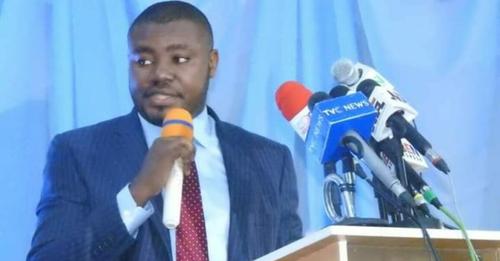Nigeria
Benue Representative Agbese calls for dialogue among workers during a strike

Dr Philip Agbese, the deputy spokesman for the House of Representatives, has urged organised labour to engage in discussion to break the impasse over the elimination of fuel subsidies in Nigeria.
Dr. Agbese, a representative for the Ado/Okpokwu/Ogbadibo Federal Constituency, spoke with journalists in Abuja on Wednesday.
He told Nigerians that the removal of the fuel subsidy by President Bola Tinubu is in their best interests.
He acknowledged that, in order to lessen the effects of growing international oil prices, the government had been habitually supplying citizens petrol below cost since the 1970s.
He pointed out that the cost of subsidising petrol has increased significantly over time and added that the system has made certain people richer.
According to Agbese, the data at hand indicated that the Buhari administration (2015–2023) paid a subsidy of over N11.4 trillion, exceeding the amount the government spent on infrastructure, health care, and education during the time period under consideration.
Although he acknowledges that President Tinubu’s decision to overthrow the dictatorship had been difficult, he believes that Nigerians will ultimately rejoice.
He asserts that fuel subsidies account for 50% of the country’s issues and that eliminating them will return the nation to its golden past.
But he warned against falling prey to agents of instability and promised that the money saved by the strategy would go into programmes for development.
“President Tinubu deserves praise for acting courageously to protect our country’s future. Fuel subsidies could no longer be obtained, he claimed.
It is known that every litre of gasoline consumed in Nigeria receives a subsidy of at least N600 totaling around N40.1 billion per day. It indicates that monthly fuel subsidies cost the government roughly N1.24 trillion.
“The nation is heavily in debt and would require additional funding to subsidise petrol. The World Bank estimates that in 2023, the government will generate fiscal savings of almost two trillion naira ($2.6 billion), or 0.9% of GDP. By the end of 2025, these savings should total more than 11 trillion naira ($14.3 billion).
“This will go towards infrastructure, education, and healthcare. The benefits of eliminating subsidies would not, in fact, appear right away. Because of the weak economy, it is not feasible. We don’t have the money to begin putting policies in place that will lessen the impact of eliminating the subsidies.
But we must see past the present. Our magnificent country’s future is at jeopardy. President Tinubu deserves praise for making this courageous choice. Nigerians will smile in due course.
Let me also take this occasion to urge Organised Labour to resist destabilisation agents who want to push us back. The Asiwaju government places a high priority on improving welfare for all citizens and providing palliative care.
“Our country cannot endure another large-scale attack. We want to create, not destroy. Therefore, the Labour should at least be patient with this administration and give discussion an opportunity. It’s still early, he explained.
